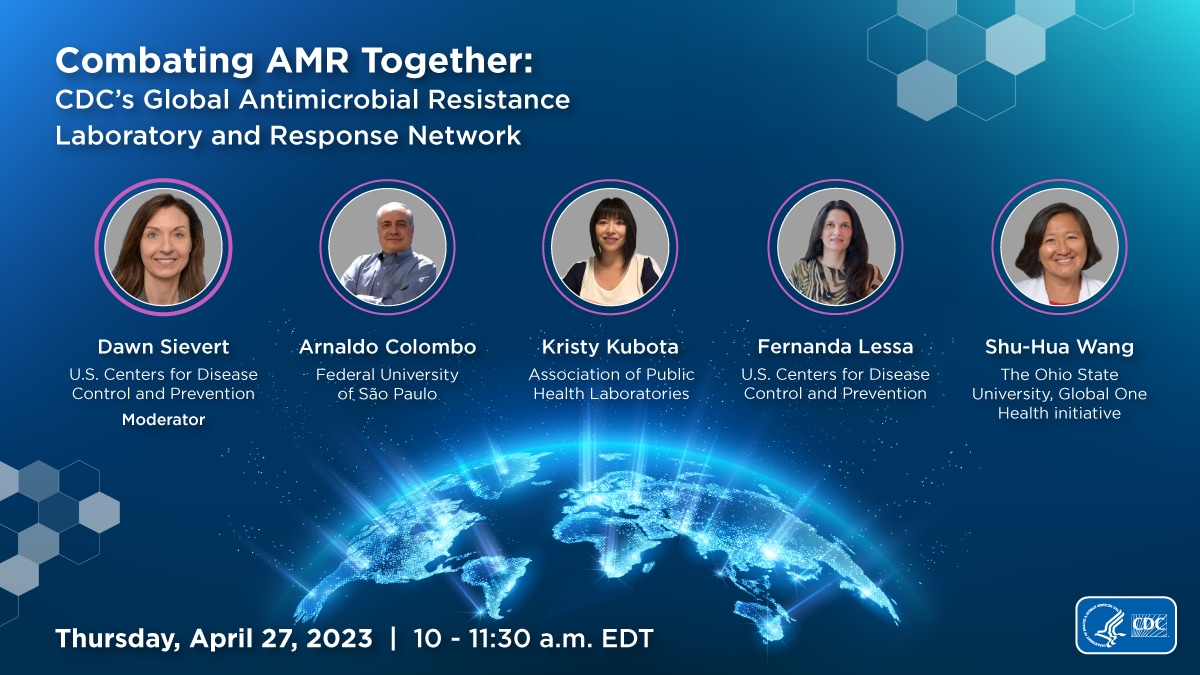Key points
- During the sixth AMR Exchange webinar, CDC and implementing partners sat down to discuss how CDC's Global Antimicrobial Resistance Laboratory and Response Network strengthens global platforms to combat antimicrobial resistance (AR) by meeting critical detection and response needs across health care, the community and the environment.
- CDC continues to build on this initiative to enhance laboratory and response capacity and capability with partners worldwide.

Experts Discuss Combating AR through Global Networks
Posted: September 2023
CDC's Global AR Lab & Response Network is a comprehensive, One Health network spanning nearly 50 countries and working with more than 20 organizations.
The Global AR Lab & Response Network, established in December 2021, strengthens global platforms to combat antimicrobial resistance by meeting critical detection and response needs across health care, the community and environment.
In the sixth installment of CDC's AMR Exchange, CDC's Dawn Sievert, Senior Science Advisor for the Antimicrobial Resistance Coordination and Strategy Unit, spoke with CDC's Fernanda Lessa and three implementing partners to illustrate the diversity of pathogens, settings and countries across the network.
Joining from Brazil, Arnaldo Colombo, a Professor of Medicine at Federal University of São Paolo, discussed the collaboration between CDC's Mycotic Diseases Branch and Oswaldo Cruz Foundation (FIOCRUZ) through the Foundation for Scientific and Technological Development in Health (FIOTEC) to strengthen laboratory capacity and capabilities to better detect and report Candida species in Brazil. Colombo explained that, with CDC's support for FIOCRUZ to provide specialized training and supplies for fungal testing in more laboratories and healthcare facilities, FIOCRUZ was able to detect and respond to a hospital's first reported Candida auris case. Early detection helped prevent further transmission in the hospital, protecting patients and healthcare professionals.
Kristy Kubota, manager of PulseNet International through the Association of Public Health Laboratories, leads the collaboration between the Global AR Lab & Response Network and PulseNet International. Through this collaboration, PulseNet International has increased its enteric disease data collection and facilitated data sharing across 13 Southeast Asian countries by supporting the development of information technology solutions for collection, tracking and reporting of data. This information is critical to better understand the burden and spread of enteric bacterial disease and antimicrobial resistance and inform country- and region-specific prevention measures.
Shu-Hua Wang, Infectious Disease Physician-scientist and Professor of Medicine at The Ohio State University, leads The Ohio State University Global One Health initiative (OSU-GOHi) in Ethiopia. Wang spoke about a three-day interactive training that OSU-GOHi provided recently for doctors, nurses and other clinical staff at two hospitals through the Global Action in Healthcare Network (GAIHN), a part of the Global AR Lab & Response Network. The training focused on infection prevention, antimicrobial stewardship, use of microbiology lab findings in clinical practice and correct specimen collection. Following the workshop, trainers and the Ethiopian Public Health Institute microbiology staff visited sentinel sites to provide support directly to clinical teams. The hospitals implementing the intervention are already observing improvements in infection prevention and control (IPC) practices such as hand hygiene and environmental cleaning and disinfection and have reported an increase in laboratory specimen collection.
CDC's Fernanda Lessa, Chief of the International Infection Control Program, showcased efforts in health care led through GAIHN. As part of the Global AR Lab & Response Network, GAIHN works to prevent, detect and respond to antimicrobial-resistant threats in healthcare settings through collaboration with laboratory and IPC teams from the local to the global level. In Argentina, CDC and partners are working in two hospitals to rapidly identify patients colonized or carrying and spreading the bacteria without symptoms of infection, with carbapenemase-producing organisms (CPO). Detecting colonized patients takes days using traditional methods. Faster methods are available for detection, but one of these methods requires the use of a rectal swab that is not readily available in Argentina. CDC and partners responded by finding, procuring, and performing laboratory verification of an alternative, cost effective swab to identify CPO rapidly. Faster identification means that healthcare professionals can implement IPC strategies more quickly to prevent the spread of dangerous organisms and protect patients.
CDC continues to build on the Global AR Lab & Response Network to enhance laboratory and response capacity and capability around the world, cultivate new partnerships and build upon existing relationships, so that this expertise and foundational work will become established and sustainable.
Watch the AMR Exchange webinar to learn more about how CDC and its partners are transforming how the world antimicrobial resistance threats across One Health through the Global AR Lab & Response Network.
